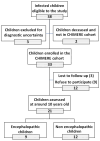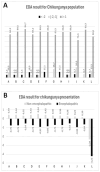Perinatal Mother-to-Child Chikungunya Virus Infection: Screening of Cognitive and Learning Difficulties in a Follow-Up Study of the Chimere Cohort on Reunion Island
- PMID: 40431715
- PMCID: PMC12116154
- DOI: 10.3390/v17050704
Perinatal Mother-to-Child Chikungunya Virus Infection: Screening of Cognitive and Learning Difficulties in a Follow-Up Study of the Chimere Cohort on Reunion Island
Abstract
In this cohort study, we evaluated the cognitive and learning difficulties of school-age children perinatally infected with Chikungunya virus (CHIKV) on Reunion Island using the Evaluation of Cognitive Functions and Learning in Children (EDA) battery screening test compared to the healthy children cohort used for EDA development. Of the 19 infected children, 11 (57.9%) exhibited subnormal or abnormal scores, of whom 3 were classified as high risk, and 8 were classified as at risk for cognitive and learning difficulties. Children who had encephalopathy were at higher risk for displaying at least one difficulty than non-encephalopathic children (relative risk 2.13; 95% CI 1.05-4.33). The difficulties observed affected verbal functions, non-verbal functions, and learning abilities, such as phonology, lexical evocation and comprehension, graphism, selective visual attention, planning, visual-spatial reasoning, dictation and mathematics, as well as core executive functions, such as inhibitory control, shifting, and working memory. Neurocognitive dysfunctions could be linked to severe brain damage, as evidenced by severe white matter reduction mainly in the frontal lobes and corpus callosum and potentially in all functional networks involved in difficulties. These results should motivate further investigation of intellectual and adaptive functioning to diagnose intellectual deficiency and severe maladaptive behaviour in children perinatally infected with Chikungunya virus.
Keywords: Chikungunya virus; arbovirus; central nervous system; cognitive function; cohort study; congenital infection; encephalitis; encephalopathy; learning difficulties; neonate.
Conflict of interest statement
The authors declare no conflicts of interest. Patrick Gérardin has received consulting fees from Valneva and Takeda.
Figures


References
-
- Chatterjee S.N., Chakravarti S.K., Mitra A.C., Sarkar J.K. Virological investigation of cases with neurological complications during the outbreak of haemorrhagic fever in Calcutta. J. Indian Med. Assoc. 1965;45:314–316. - PubMed
-
- Jadhav M., Namboodripad M., Carman R.H., Carey D.E., Myers R.M. Chikungunya disease in infants and children in Vellore: A report of clinical and haematological features of virologically proved cases. Indian J. Med. Res. 1965;53:764–776. - PubMed
Publication types
MeSH terms
LinkOut - more resources
Full Text Sources
Medical

